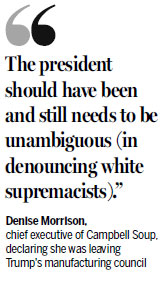2 advisory councils dismantled
WASHINGTON - President Donald Trump has abruptly dismantled two of his White House business councils - an apparent attempt to manage his increasing isolation and the continued fallout from his combative comments on the racially charged violence in Charlottesville, Virginia.
With corporate chieftains fleeing, Trump took to Twitter to explain the exodus on his own terms.
"Rather than putting pressure on the businesspeople of the Manufacturing Council & Strategy & Policy Forum, I am ending both. Thank you all!" Trump tweeted from New York.

Trump's comments came after one of the panels had already agreed to disband earlier in the day. A growing number of business leaders on the councils had openly criticized his remarks laying the blame for the violence at a white supremacist rally on "both sides".
The decision came as the White House tried to cope with the repercussions from Trump's defiant remarks a day earlier. Presidential advisers hunkered down, offering no public defense while privately expressing frustration with his comments.
Some Republicans and scores of Democrats denounced Trump's statements as putting white supremacists on equal moral footing with counter-protesters in Charlottesville and called for an apology. Although most of those Republicans, including congressional leaders, did not specifically criticize the president.
Trump himself stayed out of sight, tweeting occasionally about a primary in Alabama, the stock market and, once, his campaign slogan. Midday, he traveled from New York to his golf club in New Jersey for the night.
The president told associates he was pleased with how he had effectively stood up to the media, according to three people familiar with the conversations who demanded anonymity because they were not authorized to speak publicly about them.
Tendering
Business leaders felt differently.
Denise Morrison, chief executive of Campbell Soup, declared she was leaving Trump's manufacturing council, saying: "The president should have been and still needs to be unambiguous" in denouncing white supremacists.
CEOs had begun tendering their resignations from White House panels after Trump's initial comments following the Saturday violence. The first to step down, Kenneth Frazier of Merck, drew a Twitter tongue-lashing from the president. Later, Trump called those who were leaving "grandstanders" and insisted many others were eager to take their places.
Members of the Strategy and Policy group, led by Blackstone CEO Stephen Schwarzman, concluded after a 45-minute conference call in the morning that they would end the council and announce their decision in a statement, according to two people familiar with the discussions. They insisted on anonymity to discuss private conversations.
In a subsequent call with Trump, the president agreed it was the right course of action. He tweeted before they could announce the decision they'd reached making it appear it was his choice.
Publicly criticizing the president and resigning from his councils is a significant step for big-name corporate leaders. Though the policy influence of such advisory groups is sometimes questionable, simply meeting with Trump with TV cameras going is valuable face-time for the executives and for the president.
Under pressure, Trump made his condemnation of the Charlottesville violence more specific on Monday, naming white supremacists, the Ku Klux Klan and neo-Nazis. But he returned to his defiant self Tuesday, effectively erasing the statement he'd read a day earlier.
In an impromptu news conference in the lobby of his skyscraper, he said there were "some very bad people" among those who gathered to protest Saturday. But he added: "You also had people that were very fine people, on both sides."
Ap - Reuters
(China Daily 08/18/2017 page11)














